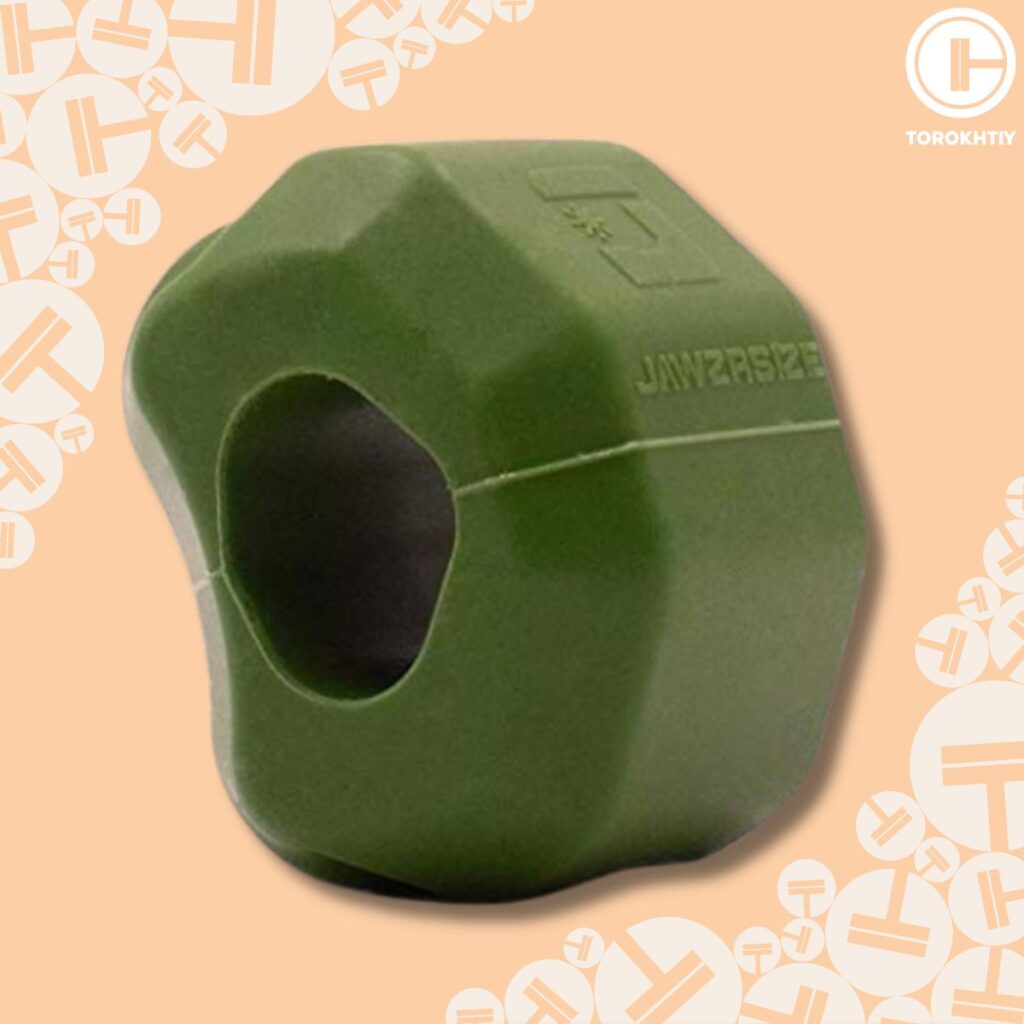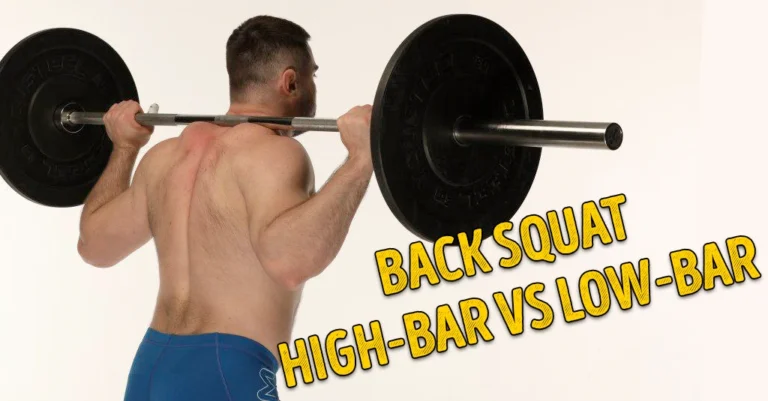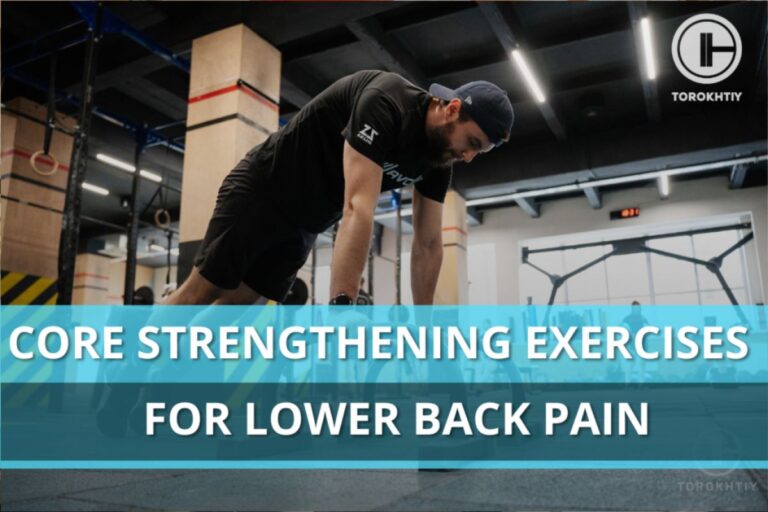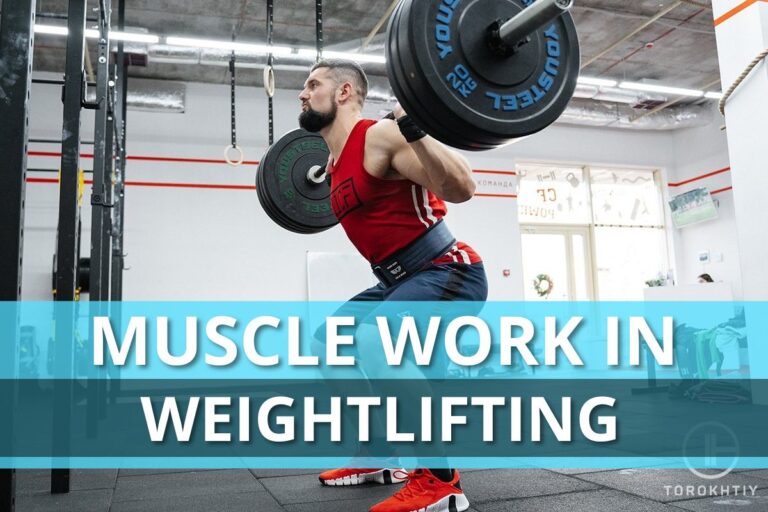Do Jaw Exercises Work? Unveiling the Truth
Do jaw exercises work or is this just another gimmick to get you to buy unnecessary products? The answer depends on who you ask. People who say things like ‘Jaw exercises are a waste of time’ are likely the ones with unrealistic expectations (e.g., achieving superb results with minimal effort).
But if the person you’re talking to has common sense and realistic expectations, you’ll find out all about the benefits of exercising your jaw, and that they go beyond physical appearance.
To answer the question, “Can you workout your jawline and see results from it”, – yes; there are a lot of exercises you can do, and if you do them properly, they really work. A chiseled jawline is one of the results from them, but along with improved facial features, they can help alleviate pain, contribute to better chewing habits, and even reduce stress and prevent some health issues.
As with any training, there’s a fine line between a practice that’s beneficial and an exercise that’s a waste of time or, worst case scenario, something potentially harmful.
Together, we’ll chew over some facts and see how you can benefit from exercising your precious jaw.
Let’s jaw!
Do jaw exercises work? Yes! Jaw exercises really work, and they have a lot of benefits – from better oral health, improved facial structure, reducing stress, all the way to helping your digestion and preventing health issues.
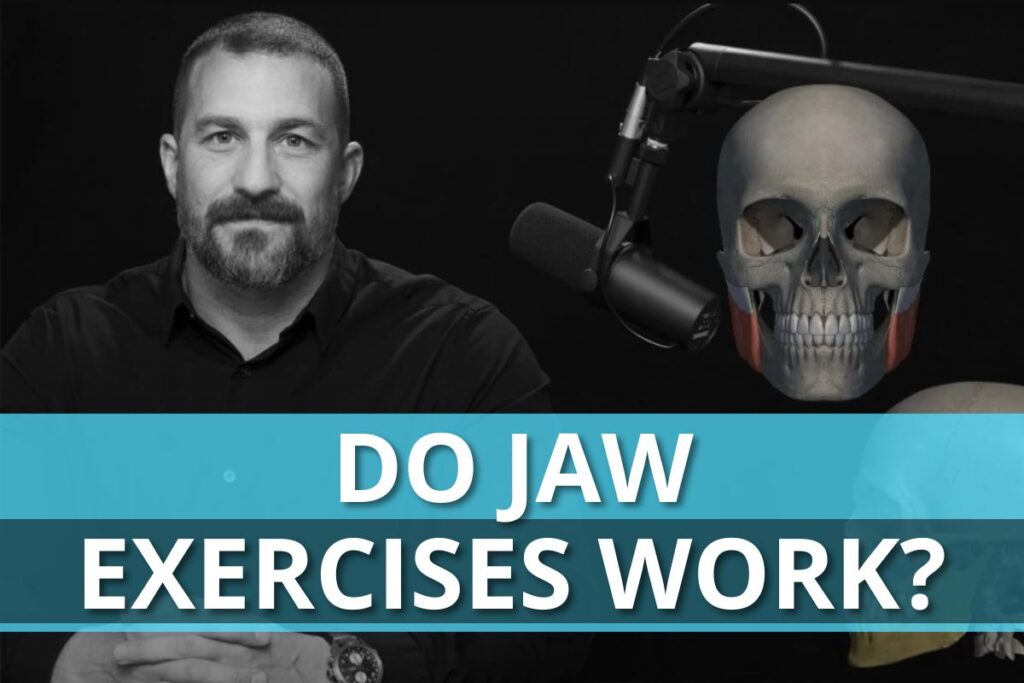
Do Jaw Exercises Really Work: Myth vs Reality
There’s a cloud of enthusiastic endorsement and skeptical criticism around jaw exercises and the effects they have on your health and appearance. Some people will look you straight in the eyes and tell you exercising your jaw has enhanced anti-aging effects, and it can change your bone structure.
Of course, these people will also have a gimmicky product they’ll try to sell you. So how do you know what’s true and what will end up wasting your time? Let’s see!
1. Defined Jawline
That person telling you it’s possible to change your bone structure with a few jaw exercises is an outright liar. One common myth is that exercising your jaw can give you a sharp, chiseled jawline regardless of what your bone structure is like.
But the truth is, although jawline exercise results usually include some jaw definition, the exercises won’t affect your bones, and the changes depend on your anatomy. You could see a significant definition in your jawline, or you can see only slight changes – it depends.
2. Weight Loss
You’ll hear people say that jaw exercises help reduce the amount of fat in your face and that leads to a slimmer appearance. Man… Wouldn’t that be something! In reality, you can’t do spot fat reduction through targeted exercises, although that would be wonderful. Jaw exercises will tone your muscles, but they won’t have any effect on the amount of fat in your face because you can’t target fat loss.
3. TMJ Disorders
The myth of jaw exercises aggravating or being harmful for TMJ disorders is one that’s especially problematic. If you do the exercises properly, they can actually help in relieving TMJ symptoms. However, before you start doing them, you should have a word with your doctor on what kinds of exercises will benefit your condition.
4. Oral Health
The myth about helping your oral health has some truth to it because oral health is more than just preventing dental issues. Jaw exercises can help you relax the muscles in your jaw and reduce teeth grinding, but they can’t substitute flossing, brushing, and dental check-ups.
5. Anti-Aging Effects
The myth about jaw exercises having anti-aging effects is probably the second most popular, right behind the one about having a razor-sharp jawline from doing a few facial movements.
Unfortunately, jaw exercises won’t reduce wrinkles around the mouth or cheeks, and they certainly won’t prevent aging. Toned muscles can help with your skin looking firmer, but they don’t have any impact on how elastic your skin is or how deep your wrinkles are.
Effectiveness of Jaw Exercises: 6 Benefits
After listing all these myths and seeing what jaw exercises don’t do, it kind of seems like you should direct your attention elsewhere and do workouts that have an effect.

But jaw exercises are effective. They’re not miraculous and you won’t be able to use them instead of fillers and Botox, but there are a lot of benefits that will make you want to start doing them right away.
✅ Better Jaw Mobility
Did you know that a sedentary lifestyle can influence the muscles in your face? As strange as it seems, it’s unfortunately true, and jaw exercises can help. A sedentary lifestyle causes a number of issues, and one of them is reducing the mobility of your jaw. To combat this, dedicate some time to exercising your jaw. It will improve and maintain range of motion, prevent stiffness, and promote general mobility.
✅ Less Stress
Tense muscles are a sign of stress, and jaw exercises can do something about it. The jaw is in close connection to the temporomandibular joint (TMD), which usually bears the brunt of stress and tension. Exercising your jaw will relax the muscles around this joint, reduce stress, and help prevent clenching or grinding your teeth, which are also signs of stress.
✅ Toned Face Muscles
You should have toned muscles throughout your body, and that includes your face. Targeted jawline exercises will make your face muscles stronger and tighter, which can have an impact on your facial features, and it can be a non-invasive way to define your jawline. Don’t expect miracles, though, this isn’t plastic surgery.
✅ Better Digestion
Efficient chewing is the first step to good digestion, and it involves more than just chewing food with your teeth – saliva also plays an important part. Jaw exercises (gentle chewing motions, for example) help with the production of saliva, which has enzymes that kickstart your digestive process. Chewing your food well will help your stomach break it down and absorb nutrients.

✅ TMD Prevention
Stress, teeth grinding, and poor jaw alignment can cause TMD, but there are ways of preventing it, and the easiest way is doing jaw exercises regularly. They will make your muscles stronger and more flexible and help prevent TMD.
✅ Less Tension Headaches and Jaw Pain
Discomfort comes from tense muscles, so you need to find ways of relaxing them. Exercising your jaw will release the tension in the muscles around it and alleviate pain. You’ll also have less tension headaches because they are associated with teeth clenching.
4 Types of Jaw Exercises
Are jaw exercises safe? Yes, if you do the correct ones. There are several types of jaw exercises you could do, depending on what your needs are.
1. Stretching Exercises
These focus on making your jaw muscles more flexible and improving the range of motion of the temporomandibular joint. Stretching exercises involve gentle, controlled motions that are supposed to elongate the muscles and release tension. They’re especially good for people who feel any stiffness or tightness in the jaw area.
2. Mobility Exercises
Mobility exercises will improve the overall movement and function of the jaw joint, and they promote a full range of jaw mobility. Improving the mobility of your jaw can contribute to better oral function and reduce the discomfort that results from restricted movement.
3. Relaxation Exercises
A lot of jaw exercises will have you making strange faces, but ones for relaxation are the complete opposite and you’re only supposed to relax – both your jaw and body. Relaxation exercises are designed to help with the tension and stress in the jaw area, but they also address the psychological factors that may contribute to the discomfort related to your jaw.
4. Strengthening Exercises
These exercises strengthen the muscles that support your jaw and stabilize the TMJ. They also help with toning your muscles and making the jaw more defined (up to a point), so they’re popular with people who expect differences in terms of their physical appearance. They’re important for promoting jaw stability and preventing issues related to weak muscles.
Potential Risks and Drawbacks
Everyone should lead an active lifestyle and work out on a regular basis, but everything comes with risks, and so do workouts. Jaw exercises are no different and there are a few things to consider before you decide to give them a try.
You know that pain and discomfort that comes from exercising? You’ll feel some discomfort from jaw exercises, too, especially when you first start doing them. Not all discomfort is bad, but you need to be able to differentiate between persisting, intense pain that points to a problem and the discomfort that comes from exercising.
If you still feel the discomfort long after the exercise is over, then the exercises you were doing were too intense and you should slow down a little. Moderation is key and you’ll strain your muscles if you do jaw exercises too often or if they’re too intense. Remember to start slowly so your muscles can adapt and then you can slowly (and safely) increase the intensity.
Everyone has different anatomy and potential health concerns, so we all respond differently to jaw exercises. If you have a pre-existing condition, dental issues, or you’ve had a recent oral surgery, be careful with exercising.
It would be best if you asked your doctor for advice because they know your medical history and their professional opinion can save you a lot of pain and trouble. A professional will also help you tailor your training routine to your needs.
You might be thinking to yourself, “That’s all fine and dandy, but how can I fit another workout session into my schedule?”. The answer is – easy. This is not your regular workout, jaw exercises are a series of movements you do when your jaw is naturally relaxed, which is usually after waking up or before going to sleep.
And in all honesty, the privacy of your bedroom is probably the best setting for doing these exercises because they’ll have you making some strange faces you probably don’t want other people to see.
Many people wonder does jawzrsize work and the answer is – yes! You can do jaw exercises without any accessories, but they can be even more effective with them. You’ll love the Pop ‘N Go – it’s made in the USA, uses patented technology, and promises to sculpt your jawline and tone your face. You use it for 20 minutes a day and you can choose between four kinds, each with a different resistance level.
This exerciser focuses mostly on slimming, tightening, and toning your jawline. The resistance levels range from 20 to 300 pounds, so it’s suitable even for complete beginners.

It’s made of food-grade silicone and polyurethane and it’s customizable, which means you’ll be able to adjust its fit to suit your mouth. All in all, this is an excellent, effective product, but unfortunately, it won’t work for people with sensitive gums.
You may be worried and wondering, “Are jaw exercises bad for your teeth?”, but they’re not bad for either teeth or gums unless you’re sensitive. The design is such that the surface of the exercises rubs against your gums, which can cause issues for people with dental issues or sensitivity.
Positives:
Could be better:
FAQ
What Device Sharpens Your Jawline?
Jaw exercisers do a good job sharpening your jawline, but they can’t do miracles. The repetitive biting and chewing targets the muscles in your jaw and tones them, but you should have realistic expectations. You’ll probably notice some definition in your jaw, but it won’t be like you had fillers or cosmetic surgery.
What Is the Most Effective Jaw Exercise?
It varies, but the most effective jaw exercises are controlled mouth opening, side-to-side movements, and gentle resistance training. It’s good to consult with a medical professional to see what exercises would be best for your needs and potential conditions.
Is It Good to Strengthen Jaw Muscles?
Yes, strengthening your jaw muscles is very good and has a lot of benefits. Strong muscles help you chew more effectively, improve the stability of your jaw, and they can help prevent issues with TMJ.
Conclusion
Whew… That was a lot of jaw talk! But hopefully, now you see why it’s important to educate people on the importance of having strong jaw muscles. So, Do jawline exercises work? If you’ve never tried these exercises, give them a try, and thank us later (hint: they work). Just remember to start slowly and have a word with your doctor to see how to approach this safely.
If you get bored, try an accessory like the Jawzrsize Pop ‘N Go Jaw, Face, and Neck Exerciser to potentially speed up your results and add some variety into jaw training.
Have you ever tried a jaw exercise or are you just an interested spectator? Has this article convinced you to start doing them? What do you think, do jaw chewers work? Which exercise will you do first?
Leave tips, tricks, comments, opinions, anything you have in the comment section and let’s help each other get stronger, healthier, and more defined jawlines!
Happy exercising!
Also read:
References:
- Erik Lindfors, Tomas Magnusson, Malin Ernberg “Patients’ Experiences of Therapeutic Jaw Exercises in the Treatment of Masticatory Myofascial Pain – A Postal Questionnaire Study,” Journal of Oral Rehabilitation 46, no. 9 (2019): 800-806.
- “Stress effects on the body,” American Psychological Association, https://www.apa.org/topics/stress/body#:~:text=URL%3A%20https%3A%2F%2Fwww,82004953054708076 (accessed January 17th, 2024)
- Hiroyuki Ishiyama, Shusuke Inukai, Akira Nishiyama, Masayuki Hideshima, Shuhei Nakamura, Meiyo Tamaoka, Yasunari Miyazaki, Kenji Fueki, Noriyuki Wakabayashi “Effect of Jaw-Opening Exercise on Prevention of Temporomandibular Disorders Pain Associated with Oral Appliance Therapy in Obstructive Sleep Apnea Patients: A Randomized, Double-Blind, Placebo-Controlled Trial,” Journal of Prosthodontic Research 61, no. 3 (2017): 259-267.
- Jong-Chi Oh, Jae-Sung Kwon “Effects of Resistive Jaw-Opening Exercise with Elastic Bands on Suprahyoid Muscle Activation in Normal Subjects,” Folia Phoniatrica et Logopaedica 70, no. 3-4 (2018): 101-108.
- Jung Ha Park, Ji Hyun Moon, Hyeon Ju Kim, Mi Hee Kong, Yun Hwan Oh “Sedentary Lifestyle: Overview of Updated Evidence of Potential Health Risks,” Korean Journal of Family Medicine 41, no. 6 (2020): 365-373.
Why Trust Us?
With over 20 years in Olympic Weightlifting, our team does its best to provide the audience with ultimate support and meet the needs and requirements of advanced athletes and professional lifters, as well as people who strive to open new opportunities and develop their physical capabilities with us.
By trusting the recommendations of our certified experts in coaching, nutrition, dietology, and sports training programming, as well as scientific consultants, and physiotherapists, we provide you with thorough, well-considered, and scientifically proven content. All the information given in the articles concerning workout programming, separate exercises, and athletic performance, in general, is based on verified data. We ensure that you can rely on our professionals’ pieces of advice and recommendations that can be treated as personalized ones which will benefit you and fully meet your needs.
The product testing process is described in more detail here
Author: Jason Li
Personal Coach, Functional Range Conditioning Mobility Specialist
Jason is an NYC personal training expert and National level Olympic Weightlifting Coach with over 10 years of experience training everyday clients to high levels of performance. He has trained everyone from youth (13 years old and under) to masters (60+ years old) to regional and national rankings for powerlifting, Olympic Weightlifting, Short distance (up to 200m) sprinting, discus & hammer throwing.

